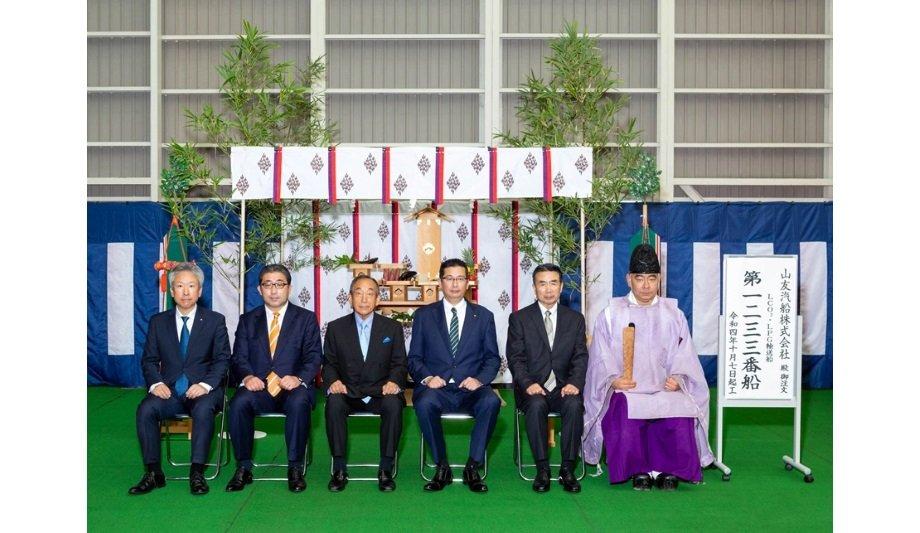Mitsubishi Shipbuilding Co., Ltd., a Mitsubishi Heavy Industries (MHI) Group company based in Yokohama, held a keel laying ceremony marking the start of construction for a demonstration test ship for transport of liquefied carbon dioxide (LCO2), to be utilised in conjunction with initiatives by the New Energy and Industrial Technology Development Organisation (NEDO) for its demonstration projects (CCUS R&D and Demonstration Related Project / Large-scale CCUS Demonstration in Tomakomai / Demonstration Project on CO2 Transportation / R&D and Demonstration Project for CO2 Marine Transportation).
The ceremony, conducted in the presence of representatives of the ship’s owner Sanyu Kisen Co., Ltd., was held at the Enoura Plant of MHI’s Shimonoseki Shipyard & Machinery Works in Shimonoseki, Yamaguchi Prefecture.
Plan demonstration experiments
The Engineering Advancement Association of Japan (ENAA), one of the consignees for the NEDO demonstration projects, will charter the ship from Sanyu Kisen, and install and operate the LCO2 marine tank system used to conduct research and development.
Three additional project partners will be commissioned by ENAA to conduct R&D on the pressure control
Three additional project partners, Kawasaki Kisen Kaisha, Ltd. (“K” LINE), Nippon Gas Line Co., Ltd., and Ochanomizu University, will be commissioned by ENAA to conduct R&D on the pressure control and stability of the LCO2 transported on the ship, and plan demonstration experiments, as well as develops and demonstrate technologies for safe and low-cost CO2 transport.
Carbon-neutral society
Representatives from Sanyu Kisen, Nippon Gas Line, and “K” LINE attended the keel laying ceremony, offering prayers for safety during construction, and the smooth completion of the vessel. Following launch, outfitting, and sea trials, the ship is scheduled to be handed over in the latter half of fiscal 2023 as an LCO2 carrier to facilitate carbon dioxide capture, utilisation, and storage (CCUS).
CCUS is gaining attention as an effective means of achieving a carbon-neutral society. Because the sources of CO2 emissions are often located distant from the sites selected for carbon utilisation or storage, demand is expected to increase for LCO2 carriers able to transport such cargo safely and economically.
Developing various technologies
MHI Group is pursuing strategic measures to strengthen its business for the energy transition
Mitsubishi Shipbuilding will draw on its experience constructing this vessel to bolster its business for MHI Group’s energy transition strategy, and will develop the various technologies for LCO2 vessels necessary to establish a CCUS value chain.
MHI Group is pursuing strategic measures to strengthen its business for the energy transition. For its part in this initiative, Mitsubishi Shipbuilding, in its ‘MARINE FUTURE STREAM’ growth strategy, has laid out a vision for the decarbonisation of the maritime economy through renewable energy and the carbon cycle, along with a safe and secure society through autonomy and electrification, and is working to generate new ideas in marine-related innovation and make them a reality.
As part of this effort, Mitsubishi Shipbuilding will actively pursue development and commercialisation of LCO2 carriers, and as a marine systems integrator, aim to achieve decarbonisation.










